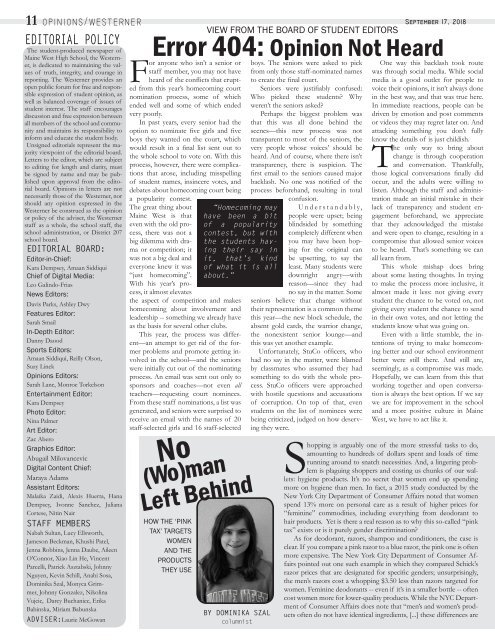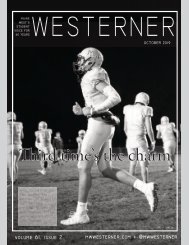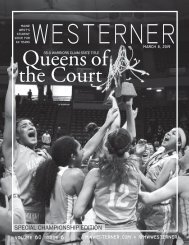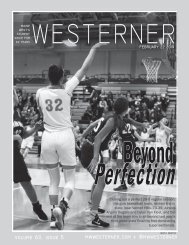September 2018
- No tags were found...
Create successful ePaper yourself
Turn your PDF publications into a flip-book with our unique Google optimized e-Paper software.
11 opinions/westerner<br />
EDITORIAL POLICY<br />
The student-produced newspaper of<br />
Maine West High School, the Westerner,<br />
is dedicated to maintaining the values<br />
of truth, integrity, and courage in<br />
reporting. The Westerner provides an<br />
open public forum for free and responsible<br />
expression of student opinion, as<br />
well as balanced coverage of issues of<br />
student interest. The staff encourages<br />
discussion and free expression between<br />
all members of the school and community<br />
and maintains its responsibility to<br />
inform and educate the student body.<br />
Unsigned editorials represent the majority<br />
viewpoint of the editorial board.<br />
Letters to the editor, which are subject<br />
to editing for length and clarity, must<br />
be signed by name and may be published<br />
upon approval from the editorial<br />
board. Opinions in letters are not<br />
necessarily those of the Westerner, nor<br />
should any opinion expressed in the<br />
Westerner be construed as the opinion<br />
or policy of the adviser, the Westerner<br />
staff as a whole, the school staff, the<br />
school administration, or District 207<br />
school board.<br />
EDITORIAL BOARD:<br />
Editor-in-Chief:<br />
Kara Dempsey, Amaan Siddiqui<br />
Chief of Digital Media:<br />
Leo Galindo-Frias<br />
News Editors:<br />
Davis Parks, Ashley Dwy<br />
Features Editor:<br />
Sarah Smail<br />
In-Depth Editor:<br />
Danny Daood<br />
Sports Editors:<br />
Amaan Siddiqui, Reilly Olson,<br />
Suzy Linek<br />
Opinions Editors:<br />
Sarah Lane, Monroe Torkelson<br />
Entertainment Editor:<br />
Kara Dempsey<br />
Photo Editor:<br />
Nina Palmer<br />
Art Editor:<br />
Zac Abero<br />
Graphics Editor:<br />
Abugail Milovancevic<br />
Digital Content Chief:<br />
Maraya Adams<br />
Assistant Editors:<br />
Malaika Zaidi, Alexis Huerta, Hana<br />
Dempsey, Ivonne Sanchez, Juliana<br />
Cortese, Nitin Nair<br />
STAFF MEMBERS<br />
Nabah Sultan, Lucy Ellsworth,<br />
Jameson Beckman, Khushi Patel,<br />
Jenna Robbins, Jenna Daube, Aileen<br />
O’Connor, Xiao Lin He, Vincent<br />
Parcelli, Patrick Asztabski, Johnny<br />
Nguyen, Kevin Schill, Anahi Sosa,<br />
Dominika Szal, Monyca Grimmer,<br />
Johnny Gonzalez, Nikolina<br />
Vujcic, Darcy Buchaniec, Erika<br />
Babinska, Miriam Babunska<br />
ADVISER:Laurie McGowan<br />
<strong>September</strong> 17, <strong>2018</strong><br />
VIEW FROM THE BOARD OF STUDENT EDITORS<br />
Error 404: Opinion Not Heard<br />
For anyone who isn’t a senior or<br />
staff member, you may not have<br />
heard of the conflicts that erupted<br />
from this year’s homecoming court<br />
nomination process, some of which<br />
ended well and some of which ended<br />
very poorly.<br />
In past years, every senior had the<br />
option to nominate five girls and five<br />
boys they wanted on the court, which<br />
would result in a final list sent out to<br />
the whole school to vote on. With this<br />
process, however, there were complications<br />
that arose, including misspelling<br />
of student names, insincere votes, and<br />
debates about homecoming court being<br />
a popularity contest.<br />
The great thing about<br />
Maine West is that<br />
even with the old process,<br />
there was not a<br />
big dilemma with drama<br />
or competition; it<br />
was not a big deal and<br />
everyone knew it was<br />
“just homecoming”.<br />
With his year’s process,<br />
it almost elevates<br />
the aspect of competition and makes<br />
homecoming about involvement and<br />
leadership -- something we already have<br />
as the basis for several other clubs.<br />
This year, the process was different—an<br />
attempt to get rid of the former<br />
problems and promote getting involved<br />
in the school—and the seniors<br />
were initially cut out of the nominating<br />
process. An email was sent out only to<br />
sponsors and coaches—not even all<br />
teachers—requesting court nominees.<br />
From these staff nominations, a list was<br />
generated, and seniors were surprised to<br />
receive an email with the names of 20<br />
staff-selected girls and 16 staff-selected<br />
No<br />
(Wo)man<br />
Left Behind<br />
HOW THE ‘PINK<br />
TAX’ TARGETS<br />
WOMEN<br />
AND THE<br />
PRODUCTS<br />
THEY USE<br />
“Homecoming may<br />
have been a bit<br />
of a popularity<br />
contest, but with<br />
the students having<br />
their say in<br />
it, that’s kind<br />
of what it is all<br />
about.”<br />
BY DOMINIKA SZAL<br />
columnist<br />
boys. The seniors were asked to pick<br />
from only those staff-nominated names<br />
to create the final court.<br />
Seniors were justifiably confused:<br />
Who picked these students? Why<br />
weren’t the seniors asked?<br />
Perhaps the biggest problem was<br />
that this was all done behind the<br />
scenes—this new process was not<br />
transparent to most of the seniors, the<br />
very people whose voices’ should be<br />
heard. And of course, where there isn’t<br />
transparency, there is suspicion. The<br />
first email to the seniors caused major<br />
backlash. No one was notified of the<br />
process beforehand, resulting in total<br />
confusion.<br />
Understandably,<br />
people were upset; being<br />
blindsided by something<br />
completely different when<br />
you may have been hoping<br />
for the original can<br />
be upsetting, to say the<br />
least. Many students were<br />
downright angry—with<br />
reason—since they had<br />
no say in the matter. Some<br />
seniors believe that change without<br />
their representation is a common theme<br />
this year—the new block schedule, the<br />
absent gold cards, the warrior change,<br />
the nonexistent senior lounge—and<br />
this was yet another example.<br />
Unfortunately, StuCo officers, who<br />
had no say in the matter, were blamed<br />
by classmates who assumed they had<br />
something to do with the whole process.<br />
StuCo officers were approached<br />
with hostile questions and accusations<br />
of corruption. On top of that, even<br />
students on the list of nominees were<br />
being criticized, judged on how deserving<br />
they were.<br />
One way this backlash took route<br />
was through social media. While social<br />
media is a good outlet for people to<br />
voice their opinions, it isn’t always done<br />
in the best way, and that was true here.<br />
In immediate reactions, people can be<br />
driven by emotion and post comments<br />
or videos they may regret later on. And<br />
attacking something you don’t fully<br />
know the details of is just childish.<br />
The only way to bring about<br />
change is through cooperation<br />
and conversation. Thankfully,<br />
those logical conversations finally did<br />
occur, and the adults were willing to<br />
listen. Although the staff and administration<br />
made an initial mistake in their<br />
lack of transparency and student engagement<br />
beforehand, we appreciate<br />
that they acknowledged the mistake<br />
and were open to change, resulting in a<br />
compromise that allowed senior voices<br />
to be heard. That’s something we can<br />
all learn from.<br />
This whole mishap does bring<br />
about some lasting thoughts. In trying<br />
to make the process more inclusive, it<br />
almost made it less: not giving every<br />
student the chance to be voted on, not<br />
giving every student the chance to send<br />
in their own votes, and not letting the<br />
students know what was going on.<br />
Even with a little stumble, the intentions<br />
of trying to make homecoming<br />
better and our school environment<br />
better were still there. And still are,<br />
seemingly, as a compromise was made.<br />
Hopefully, we can learn from this that<br />
working together and open conversation<br />
is always the best option. If we say<br />
we are for improvement in the school<br />
and a more positive culture in Maine<br />
West, we have to act like it.<br />
Shopping is arguably one of the more stressful tasks to do,<br />
amounting to hundreds of dollars spent and loads of time<br />
running around to snatch necessities. And, a lingering problem<br />
is plaguing shoppers and costing us chunks of our wallets:<br />
hygiene products. It’s no secret that women end up spending<br />
more on hygiene than men. In fact, a 2015 study conducted by the<br />
New York City Department of Consumer Affairs noted that women<br />
spend 13% more on personal care as a result of higher prices for<br />
“feminine” commodities, including everything from deodorant to<br />
hair products. Yet is there a real reason as to why this so-called “pink<br />
tax” exists or is it purely gender discrimination?<br />
As for deodorant, razors, shampoo and conditioners, the case is<br />
clear. If you compare a pink razor to a blue razor, the pink one is often<br />
more expensive. The New York City Department of Consumer Affairs<br />
pointed out one such example in which they compared Schick’s<br />
razor prices that are designated for specific genders; unsurprisingly,<br />
the men’s razors cost a whopping $3.50 less than razors targeted for<br />
women. Feminine deodorants -- even if it’s in a smaller bottle -- often<br />
cost women more for lower-quality products. While the NYC Department<br />
of Consumer Affairs does note that “men’s and women’s products<br />
often do not have identical ingredients, [...] these differences are


















